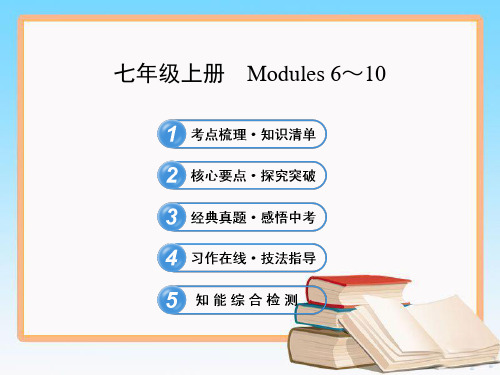2017外研版备战中考 初一英语七年级上册 Modules 6~10复习课件
合集下载
初中英语外研版七年级上册《复习全册(含语法讲解和精选习题)》课件

you
he
him
she
her
it
it
复数 主格 we you
宾格 us you
they
them
1.人称代词主格:在句子中作主语的代词。 (1)主格在句中作主语,常置于句首。例如:
I am in Class Two. 我在二班。
He is twelve years old. 他今年12岁了。 (2)多个人称代词连用时的排列顺序是: ①单数:第二人称(you)+第三人称(he/she/it)+第一人 称(I),例如: You,he and I are students. 我、你和他都是学生。
外研版 初中英语 七年级上册
复习课件全册
(含语法讲授和精选习题)
教学课件
Modules 1-3 模块过关测试卷 Modules 4-5 模块过关测试卷 Modules 1-5 阶段综合测试卷一 Modules 6-8 模块过关测试卷 Modules 9-10 模块过关测试卷 Modules 6-10 阶段综合测试卷二 Modules 1-10 阶段综合测试卷三 Modules 1-10 阶段综合测试卷四
( )9.Tom and I ________good friends. A.am B.is C.are D./
[答案] C 考核be(am, is, are)动词的用法。口诀:我用 am你用are,is紧跟他、她、它,其他人称都用are。例如:
( )(5)—Are you Peter?
—________.
是的,它是。
—Are they from Xinjiang? 他们来自新疆吗?
—No, they aren't. 不,他们不是。 注意:它们的用法随人称和数的不同而变化,可记住下 列口诀,避免出错。“我(I)用am,你(you)用are, is 连接他 (he)、她(she)、它(it)。单数词用is,复数词全用are。” 2.在一样现在时的表达中关于动词be的常用句式: (1)be+形容词,例如: I am very happy.
Module 10 模块复习课件-英语七年级上册(外研版)

重要短语句型归纳
1.Hi, Lingling. This is Tony speaking. 您好,玲玲。我是Tony。 2.What’s happening ?=What are you doing? 你在做什么? 3.Are you getting ready for Spring Festival? 你们正为春节做准备吗? 4.We’re getting lots of food ready for SpringFestival. 我们正为春节准备大量的食品。 5.She’s cleaning the house and putting thingsaway. 她正打扫房间和整理东西。 6.Spring Festival happens every year, but not onthe same day. 春节每年都会来,但不在同一天。 7.It usually comes in February . 春节常在二月份。 8.Here’s a photo for you. 这儿有一张照片给你。5. 9.My mother is sweeping away bad luck. 我母亲正把霉运扫去。 10.We are celebrating Spring Festival with a traditionalfamily dinner on New Year’s Eve. 在除夕夜,我们以一顿传统的家庭晚餐来庆祝春节 11.Hongbao means lucky money. 红包就是压岁钱。 12.Spring Festival finishes at Lantern Festival.春节在元宵节结束。 13.He is still at work.=He is still working . 他仍然在工作。
考点通过
英语外研版七上Modules6-10(41张ppt

·外研版(衔接)
│ 重点突破
(2) 类似的结构还有: write sb. sth. = write sth. to sb. pass sb. sth. = pass sth. to sb. give sb. sth. = give sth. to sb. buy sb. sth. = buy sth. for sb. make sb. sth. = make sth. for sb.
·外研版(衔接)
重点 句型
│ 基础过关
重点 句型
4. 贝蒂,举行一次生日晚会怎么样? What ______ about ________ having a birthday party, ______ Betty? 5. “这只熊猫来自中国吗?” “是的。” —______ Does the panda ______ come ______ from China? does —Yes, it ________. 6. “你多长时间使用一次电脑?” “每周一次。” How often _____ do you use a — _______ ________ computer? Once a week. — _______
·外研版(衔接)
(1)
(2) (3) (4)
│ 重点突破
send v.寄;送 [点拨] (1) send常用于send sb. sth.或send sth. to sb.结构中,意为“寄(送)某物给某人”。如: I send him my email address. = I send my email address to him. 我把邮件地址过关
重点 短语
16. 17. 18. 19. 20. 21. 22.
(课间)休息 ________________ have a break 一条牛仔裤 __________________ a pair of jeans 下载音乐 _________________ download music send emails 发电子邮件 ______________ go online 上网 ____________ keep healthy 保持健康 _______________ at once 立刻;马上 __________
202X年中考英语总复习课件(外研版七上Modules6-10)

【自主归纳】
_h_o_m_e_ 家;家乡;本国 指家庭成员在一起生活的地方
_h_o_u_s_e
房子
_fa_m__i_ly_
家庭 家庭成员
主要指建筑物、住宅,可以包含若 干房间(rooms) 指“一个家庭”时,视为一个整体, 用作单数名词,谓语动词用 _单__数__ (单数/复数)
指“家庭成员”时视为复数名词, 谓语动词用复_数____ (单数/复数)
4. ——熊猫来自中国吗? ——是的。 —_D__o_e_s_ the panda _c_o_m_e__ from China? —Yes, it _d_o_e_s_. 5. ——袋鼠是澳大利亚的吗? ——是的。 — _I_s_ the kangaroo Australian? —Yes, it _i_s.
【见P150】 【见P137】
1. ask v. 询问;问 ◆Tony asks Daming to go to a basketball match. 托尼邀请大明去一场篮球比赛。
①(2012·重庆中考)Mr. Li asks the students _______ in the river, because it’s too dangerous.
【自主归纳】 (1) (2)
A. 强调说话的能力或说某种语言 B. 指连续不断地讲话,强调交谈
(3)
C. 告诉;讲述,强调讲给别人听
(4)
D. 强调说话的内容
答案:①D ②say hello to ③not to open
3. house n. 房子,住宅 ◆My school is next to my house. 我的学校和我家紧挨着。 用house/ home/ family填空 ①The big white _______ is mine. ②Look at the photo of my _______. It is a big one. ③East or west, _______ is the best.
英语七年级上外研版module6 复习课 精品课件1汇总

考点二 D after the “How much do you _______ winter holiday?” means “What’s the _______ of you after the winter holiday?”
A.weighs;weigh B.weigh;weightier
body身体 head hair ear face eyebrow 眉毛 eye nose mouth tooth beard 络腮胡子 mustache上唇的小胡 子 neck 脖子 throat 喉咙 chest 胸部 abdomen腹部 stomach 胃 lung 肺 heart 心脏 liver 肝脏 shoulder 肩 膀
ve a happy safe and healthy life
宁津县育新中学
Module 6 (Revision) Look after yourself! 复习导 航
知 识 回 顾 话 题 拓 展
强 化 考 点 中 考 链 接
6.No smoke
2.No couch potato
3. Watch diet
important,plenty of
the right things
above all, see …as
fast food
now and then the wrong diet put on weight an unhealthy life
Rest up while you can
rest up,need as much sleep ,get eight hours’ sleep,
考点七
He ______ his leg when he fell. C
Module 6 模块复习课件-英语七年级上册(外研版)

16.The tiger often catches many kinds of animalsfor food.
重要语法归纳
Look! There she is! 看!她在那儿! 这句话的正常语序是“Look, she is there.” there提前是为了强调地点。 副词 there, here等置于句首使用倒装语序。 eg: Look, here comes the bus! 看,公共汽车来了! 注意: 当主语是名词时用完全倒装,即“There/Here + 谓语 + 主语” 当主语是人称代词时,则不用倒装,即“There/Here + 主语 + 谓语” eg: Here are the books. 给你书。 There goes the thief! 有贼! There you go again. 你又来这一套。 Here you are. 给你。
men teachers. A.the other B.the others C.others D.other 5.—Where is Mrs Chen? —Look , ________. A.there is she B. there does she C.there she is D.there she does
重要语法归纳
①主语是第三人称单数的行为动词的一般现在时否定形式是在行为动词的前面加 doesn’t(does not),这时要注意把谓语动词还原为动词原形。 Eg:Peter has breakfast every day. Peter doesn’t have breakfast every day. Paul plays basketball on Wednesday. Paul doesn’t play basketball on Wednesday. ②主语是第三人称单数的行为动词的一般现在时疑问式是在句首加助动词does,后面 的谓语动词还原为动词原形.其肯定与否定回答用Yes, X does./ No, X doesn’t. 如下面表达方式: Does X…? Yes, it does./ No, it doesn’t. Eg:Does he have breakfast every day ? Yes, he does./ No, he doesn’t.
重要语法归纳
Look! There she is! 看!她在那儿! 这句话的正常语序是“Look, she is there.” there提前是为了强调地点。 副词 there, here等置于句首使用倒装语序。 eg: Look, here comes the bus! 看,公共汽车来了! 注意: 当主语是名词时用完全倒装,即“There/Here + 谓语 + 主语” 当主语是人称代词时,则不用倒装,即“There/Here + 主语 + 谓语” eg: Here are the books. 给你书。 There goes the thief! 有贼! There you go again. 你又来这一套。 Here you are. 给你。
men teachers. A.the other B.the others C.others D.other 5.—Where is Mrs Chen? —Look , ________. A.there is she B. there does she C.there she is D.there she does
重要语法归纳
①主语是第三人称单数的行为动词的一般现在时否定形式是在行为动词的前面加 doesn’t(does not),这时要注意把谓语动词还原为动词原形。 Eg:Peter has breakfast every day. Peter doesn’t have breakfast every day. Paul plays basketball on Wednesday. Paul doesn’t play basketball on Wednesday. ②主语是第三人称单数的行为动词的一般现在时疑问式是在句首加助动词does,后面 的谓语动词还原为动词原形.其肯定与否定回答用Yes, X does./ No, X doesn’t. 如下面表达方式: Does X…? Yes, it does./ No, it doesn’t. Eg:Does he have breakfast every day ? Yes, he does./ No, he doesn’t.
外研版2017年中考一轮教材复习课件:七年级上册 modules 6-10
Unit 8
Listen attentively
重难点梳理
二
重点短语
Unit 8
(be) bad for 10.对……有害的________ (be) interested in 11.对……感兴趣________ 12. ( 绘 画 、 雕 塑 等 ) 艺 术 作 品 work of art ________
Listen attentively
重难点梳理
一
重点单词
Unit 8
unusual interview 1.与众不同的;不寻常的______ 2.采访______ model 3.模型______ 4.邮票______ stamp
doorbell 5.门铃______
6.前面的______ front silver 8.按;揿;摁______ push 7.银色的;银白的______ soon 9.不久______ 10.孙子;外孙______ grandson granddaught newspap 11.孙女;外孙女 ______ 12.报纸______ er er
Listen attentively
重难点梳理
二
重点短语
model 1.飞机模型________ planecard phone 2.电话卡________ front door 3.前门________ start doing sth. 4.开始做某事________ 5.走进去________ go inside follow someone into... 6.跟某人进入……________ living room 7.客厅;起居室________ spend...in doing sth. 8.花时间做……________ a waste of time 9.浪费时间________
外研版七年级英语上册教学课件全套(下)
新课导入
思 考思 考
Have you ever been to the zoo? Do you know them?
新课讲解
一说
1 Listening and vocabulary
Look at the picture. What can you see? bear elephant giraffe lion monkey√ panda tiger zebra zoo
I can see elephants, giraffes,zebras...
新课讲解
一说 2
Listen and check(√)the words you hear in Activity 1.
Now work in pairs and say what you can see. —There are three giraffes. —Yes,and there are some zebras.
新课讲解
Guide: Yes,they do,but they also eat plants. Tony: Look at this elephant. It's very tall. Does it eat meat? Guide: No,it doesn't. It eats plants. Lingling:Do pandas eat plants? Guide: Sure. They love bamboo. Lingling:Are there pandas here? They're my favourite animals.
新课讲解
3 Listen and read.
Guide:Welcome to Beijing Zoo. The zoo has many kinds of animals,such as bears,zebras,giraffes and pandas. They come from many different countries and they eat different food. Here are the lions. Tony: Do lions eat meat? Guide:Yes,they do. They eat other animals. They're dangerous! Lingling:Ugh! And what about bears? Do they eat meat ?
七年级英语上册外研复习课件M6-10
想要做某事
would like sb.to do sth.
想要某人做某事
我今晚想去看电影。 Would you like some cakes?你想要些蛋糕吗?
(2)with prep.和??一起 【归纳】 with+n./pron./复合宾语的用法:
with +
(1)“和??一起”,表示伴随、跟随
n./pron./ (2)“带有??;具有??”,表示所有、附带
复合宾语, (3)“用??”,表示运用某种工具或身体某一部位
在句子中 (4)表示伴随情况
作状语、 (5)“在??身上”, take...with sb. 随身携带
表语和定 (6)“对于;关于”, be angry/pleased/satisfied with sb. 对某人生
1.Would you like to go to the cinema with
Betty and me?
2.Let's go in the evening.
3.Tony asks Daming to go to a basketball
重
match.
点 句 型
4.It's half_past_six. 5.She often goes to concerts and she usually
七年级(上) Modules6~10
复习目标导航
考点完全攻略
同步训练
类别
重 点 词 汇 拓 展
新课标要求 1.invitation→v.邀请 invite
2.film→(同义词) movie
3.with→(反义词) without
4.let's→(扩写) let_us
2024年外研版中考英语一轮教材复习七年级上册Modules+6~10课件
七年级上册 Modules 6~10
重点单词
Module 6 1.大象 n. 2.长颈鹿 n. 3.猴子 n. →pl. 4.熊猫 n. 5.斑马 n.
基础知识自测
___e_le_p_h_a_n__t __ ____g_ir_a_f_f_e___ ___m__o_n_k_e_y___ ___m_o_n__k_e_y_s __ ____p_a_n_d_a____ ____z_e_b_r_a____
20.__
21.大的,巨大的 adj. ____la_r_g_e_____
22.通常的,平常的 adj. ___u__su__a_l ____
→通常 adv.
___u_s_u_a_ll_y____
→(反义词)不寻常的
_u_n__u_su__a_l ____
23.独自地 adv.
_k_e_y_b_o_a_r_d____ ___m__o_u_s_e____ ____m__ic_e_____ __s_c_r_e_en______ __co_n__n_e_ct_____ ____le_a_r_n_____ le_a_r_n_e_d_/_le_a_r_n_t_ ___le_a_r_n_e_r____
31.文件 n. 32.点击 v. 33.使用 v. →有用的 adj. 无用的 adj. →有用地 adv. 无用地 adv. →用户 n.
_d_o_c_u_m__e_n_t___ ___c_l_ic_k______ _____u_s_e_____ ____u_se_f_u_l____ ___u_s_e_l_es_s____ ___u_s_e_fu_l_ly____ __u__se_l_e_ss_l_y___ ____u_s_e_r_____
重点单词
Module 6 1.大象 n. 2.长颈鹿 n. 3.猴子 n. →pl. 4.熊猫 n. 5.斑马 n.
基础知识自测
___e_le_p_h_a_n__t __ ____g_ir_a_f_f_e___ ___m__o_n_k_e_y___ ___m_o_n__k_e_y_s __ ____p_a_n_d_a____ ____z_e_b_r_a____
20.__
21.大的,巨大的 adj. ____la_r_g_e_____
22.通常的,平常的 adj. ___u__su__a_l ____
→通常 adv.
___u_s_u_a_ll_y____
→(反义词)不寻常的
_u_n__u_su__a_l ____
23.独自地 adv.
_k_e_y_b_o_a_r_d____ ___m__o_u_s_e____ ____m__ic_e_____ __s_c_r_e_en______ __co_n__n_e_ct_____ ____le_a_r_n_____ le_a_r_n_e_d_/_le_a_r_n_t_ ___le_a_r_n_e_r____
31.文件 n. 32.点击 v. 33.使用 v. →有用的 adj. 无用的 adj. →有用地 adv. 无用地 adv. →用户 n.
_d_o_c_u_m__e_n_t___ ___c_l_ic_k______ _____u_s_e_____ ____u_se_f_u_l____ ___u_s_e_l_es_s____ ___u_s_e_fu_l_ly____ __u__se_l_e_ss_l_y___ ____u_s_e_r_____
- 1、下载文档前请自行甄别文档内容的完整性,平台不提供额外的编辑、内容补充、找答案等附加服务。
- 2、"仅部分预览"的文档,不可在线预览部分如存在完整性等问题,可反馈申请退款(可完整预览的文档不适用该条件!)。
- 3、如文档侵犯您的权益,请联系客服反馈,我们会尽快为您处理(人工客服工作时间:9:00-18:30)。
类别 重 点 句 型 整 理
新课标要求 6. We're enjoying the school trip a lot. 我们非常喜欢学校的这次郊游活动。 7. Anyway, it's time to go back to school now. 不管怎样,现在是回学校的时间了。 8. Are you getting ready for Spring Festival? 你们在为春节做准备吗?
【归纳拓展】 turn 的常见短语 turn up 调大;调亮 turn over 翻转 turn down 调低;调暗 turn around 转身
turn to...求助于„„ ;翻到„„ 温馨提示 : turn on 等由“动词+副词”构成的短语,代词作宾语 时须把代词放在动词与副词之间。
类别 重 点 短 语 记 忆 1. such as 比如
新课标要求
2. come from 来自 3. look at 看 4. all over the world 全世界 5. as well as 并且,还 6. be good at 擅长
类别 重 点 短 语 记 忆
新课标要求 7. many kinds of 许多种类 8. turn on 打开 9. search for 搜寻;查找 10. at weekends 在周末 11. Hear from 收到„„的来信 12. take photos 拍照 13. wait for 等待,等候
类别 重 点 句 型 整 理
新课标要求 4. Hi, would you like to come to my birthday party? 你们好,你们愿意来参加我的生日聚会吗? 5. What do you usually do at a Chinese birthday party? 在一个中国的生日聚会上你们通常做什么?
【妙辨异同】
such as 与 for example
一般用于列举同一类人或事物中的几个例子,但
such as 必须少于前面所提及的事物的总数,位置只能在 所列举出的名词之前 for 一般用于列举同一类人或事物中的一个例子,位 example 置较为灵活,可位于句首、句中或句末
He knows several languages, such as English and French. 他懂好几门语言,比如英语和法语。
类别 重 点 短 语 记 忆
新课标要求 14. a few 一些;几个 15. on sale 正在出售 16. go back 回去 17. get off 下(飞机、火车、公共汽车等) 18. get ready for 为„„做好准备
类别 重 点 短 语 记 忆
新课标要求 19. at the moment 此刻,目前 20. at work 在工作 21. put away 收起;收拾好 22. hurry up 赶快 23. sweep away 扫去
类别 重 点 词 汇 拓 展
新课标要求 5. final(adj.) →finally (adv.)最后 6. print(v.) →printer (n.)打印机 7. music(n.) →musical (adj.)音乐的 8. special(adj.) →specially (adv.)尤其; 特别 9. happy(adj.) →happily (adv.)幸福地;快 乐地
七年级(上) Modules 6~10
类别 重 点 词 汇 拓 展
新课标要求 1. too (adv.)→also (同义词 adv.)也;而且 →as well (同义词组)→either (adv.)也(不) 2. fun(n.) →funny (adj.)有趣的 3. Asia(n.) →Asian (adj.)亚洲的 4. Europe(n.) →European (adj.)欧洲的
类别 重 点 句 型 整 理
新课标要求 1. There she is!她在那儿! 2. How do I write my homework on the computer? 我怎样在电脑上写作业呢? 3. First, connect the screen to the computer. 首先,把屏幕连接到电脑上。
1. The zoo has many kinds of animals, such as bears, zebras, giraffes and pandas. 动物园里有许多种动物,比如 熊、斑马、长颈鹿和大熊猫。(Module 6) 【考点透析】 such as 意为“例如;比如;像„„这 样”, 表示列举。 They planted many flowers , such as roses and sunflowers.他们种了许多种花,比如玫瑰花、向日葵。
I like fruit, for example, I often eat bananas in the evening. 我喜欢水果,例如,我经常在晚上吃香蕉。
2.Finally, turn on the computer. 最后,打开电脑。(Module 7) 【考点透析】 turn on “打开(电视机、电灯等)”,其 反义短语为 turn off。 Turn on the TV and let's watch the World Cup. 打开电视咱们看看世界杯吧。
类别 重 点 词 汇 拓 展
新课标要求 10. sun(n.) →sunny (adj.)晴朗的 11. drive(v.) →driver (n.)司机 12. luck(n.) →lucky (adj.)幸运的 →luckily (adv.)幸运地 13. tradition(n.) →traditional (adj.)传统的 →traditionally (adv.)传统地 14. mean(v.) →meaning (n.)意义;意思
